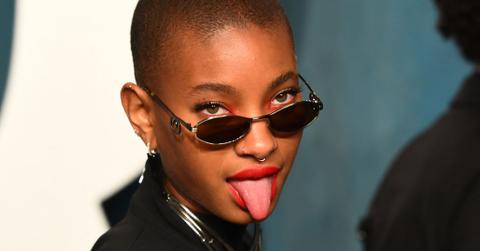
Philosophizing Fame: The Deep Thoughts of Willow Smith
By Francis MbuguaNov. 9 2023, Published 9:55 a.m. ET
Willow Smith has lived a different lifestyle from the rest of us since she was young. The "Whip My Hair" star entered the world of entertainment from an early age when she appeared alongside her father on I Am Legend at just 7 years old. She also found success as a musician while she was still young. And even though she's only 23, it feels like she is older, owing to her accolades. Being in the public glare from your toddler age can do that.
Being such a public figure also creates unique perspectives about life and everything we encounter. She has come out as quite philosophical in interviews.
In an interview with Pharrell Williams for Interview Magazine, Willow showed she has a philosophical side to her. When Williams asked, "So, what's up, guys? What's on your mind, Willow?" Her response went straight into the philosophical realm despite the actor and musician being 17 years old at the time.
"This morning actually was pretty intense because I was thinking about the world and my place in the world, things that I have made or want to make," she said. "I was thinking about all the things that I could do that I don't do. But, you know, I was just thinking about the world and everything."
Willow's Philosophy on Fame
Like many other child stars, Willow has struggled with fame before. After her mega-hit “Whip My Hair,” she took a hiatus from music. In a conversation with Sirius XM's "Bevelations," she said, "I saw the dark path I could have gone down. I think I kind of caught myself before my coping mechanisms started too early. I knew I needed to be a kid."
She explains further, noting, "I had touched a sadness that I didn't know existed. And that was terrifying. Because I was like, 'I've never felt this before. I don't know, this is obviously not healthy.' I need to stop this before it becomes a darker, a darker place.'"
Willow concludes, saying, "And realistically, in my young mind, I really didn't know. I just knew it felt wrong. I just knew it. I just knew everything felt wrong."
However, that does not mean she did not know the power of fame. She has mentioned in many interviews that fame should be used for the good of others. For instance, when discussing the impact of growing up in the public eye by Glamour, she said, "I just try to be of service because that's all that matters, really."
Exploring Willow Smith's Philosophical Religion
Most people are introduced to religious teachings by their parents. But it doesn’t seem like Jada and Will Smith’s religious beliefs did rub off on Willow. She is a case of being self-taught and learning through her own curiosity.
Her parents have been speculated to be Scientologists. Jada cleared up the issue in her memoir. She noted that she was attracted to the church's overall teachings but never intended to become a member of the church.
She wrote, "I was very clear when I stepped into the Church of Scientology that becoming a member would not be possible, nor was it my goal." However, she explains that they used the church's "Basic Study Manual" in some aspects of home-schooling Willow and her older brother Jaden.
Additionally, Will and Jada founded the New Village Leadership Academy, a church that investigations found to resemble the Scientology teachings closely.
Nonetheless, Jada has said that Willow had been given the freedom to determine what they did to their bodies, minds, and spirits. It's likely that she was not forced to take up the religious beliefs of her parents.
Consequently, her religion could be anything. After all, the only indication that she is religious. The 23-year-old Willow mentioned her "journey of self” in an interview with Fader.
Moreover, Willow admitted reading about spirituality (and science) helped her overcome self-harming. Self-harming was a practice she said provided her with “a physical release of all the intangible pain that’s happening in your heart and in your mind.”
While talking about her experience on the Red Table Talk, she said, “I was like, ‘This is pointless — my body is a temple,’ and I completely stopped. It seemed literally psychotic after a certain point because I had learned to see myself as worthy.”

